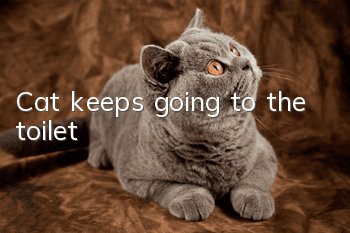Cat keeps going to the toilet

1. The kittens are not weaned. If the kitten is not weaned, it is normal to go to the toilet more frequently because it needs to drink milk frequently to supplement nutrition.
2. The cat is in estrus. When a cat is in estrus, he will go to the toilet frequently, and he will also meow when he is in estrus.
3. Cats suffer from constipation. Cats often feel like they want to defecate but cannot poop out or the amount they poop out is very small. You can use Kaiselu to soften the feces, but do not let the cat rely on Kaiselu to defecate.
4. Urinary system problems. Cats suffering from kidney disease, urinary tract infection, or urinary tract stones can stimulate the urethral mucosa and produce the urge to urinate, but the urine output is very small or even no urine or hematuria occurs. This situation should be sent to a pet hospital for treatment in time.
5. The cat is pregnant. Cats may also go to the toilet frequently because of pregnancy. As the kittens grow larger in the mother cat's belly, they will put pressure on the mother cat's internal organs. If the female cat's bladder is squeezed, there is no way to store urine, and the cat will go to the toilet frequently. When a female cat gives birth to kittens, the frequent bathroom breaks will disappear.
6. Cats drink too much water. Cats will go to the bathroom more often if they drink a lot of water.
7. Chronic nephritis. Chronic nephritis can cause frequent urination, abdominal pain, loss of appetite, etc. If the cat behaves abnormally, the owner should take it to the hospital for examination as soon as possible.
Why cats urinate blood:
1. There is a problem with the urinary system. Cats' urethra and bladder are infected, or the ureters are damaged, or there are stones in the body, etc. These may cause cats to have blood in their urine.
2. Insufficient drinking water. Some cats do not like to drink water and lack water in their bodies, which makes it difficult for cats to urinate. If the concentration of urine is too high, it is easy to find urinary tract blockage, leading to blood in the urine.
3. Food poisoning. If a cat eats taboo foods, such as garlic, chocolate, etc., the cat may cause food poisoning after accidentally ingesting it, causing the cat to suffer from vomiting, diarrhea, blood in the urine and other adverse phenomena. If you accidentally eat a small amount, you can induce vomiting first, and feed the cat more water to speed up metabolism and expel trace toxins from the body. Cats that have been seriously ingested by mistake are advised to send their owners to the hospital for treatment as soon as possible.
4. Dietary problems. If your cat often eats food that is heavy in oil and salt, it will put a certain burden on the kidneys. In the long run, it will cause certain damage to the cat's body, and it is very likely that hematuria will occur.
5. The cat litter is not replaced in time. If the owner changes the litter box for too long or fails to clean the litter box in time, a large amount of excrement accumulates and breeds bacteria, causing the cat to develop a urinary tract infection and blood in the urine.
6. Stress response. Cats are very insecure animals. When a cat is frightened or stimulated while sleeping or urinating, it will also cause the cat to urinate blood.occur.
- How to feed short-haired Persian cats
- Can cats drink Huoxiang Zhengqi water?
- Cats are adorable, do you know how to feed kittens scientifically?
- How to raise Burmese cats Burmese cat raising tips
- How to raise British Shorthair cats British Shorthair feeding tips
- Cat bleeds after giving birth
- What are the characteristics of feline calicivirus?
- What causes cat urethral hyperplasia?
- At what age can cats be vaccinated against rabies?
- How many days does it take for a newborn kitten to pass through the dangerous period?



